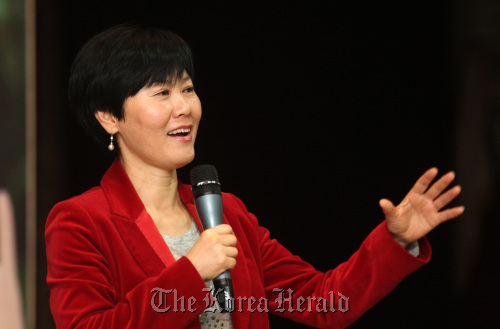Travel writer and relief worker Han Bi-ya, called on the Korean government on Tuesday to shift its foreign aid policy to a more specialized, grant-based approach.
She underlined the significance of close cooperation between the government, development-related agencies and non-governmental organizations in crafting programs that reflect the needs of recipients.
“While Korean NGOs and other related sectors have secured some level of professionalism in development and relief activities, the government has not kept up with them because it keeps rotating staff from one position to another under its personnel policy,” Han told a news conference hosted by the Foreign Ministry.
“Though the ministry has done a good job sending emergency relief during previous disasters such as the earthquakes and tsunami in Japan last year, it simply followed its manual rather than acting with its own long-term strategies.”
The 49-year-old globe-trotting writer shot to fame with her bestselling 2005 book, “Marching off the Map,” which earned her the nickname, “Daughter of the Wind.”
Han ventured into relief work in 2001 and spent nine years as relief team leader at World Vision Korea, a Christian aid and development organization. She then obtained her master’s degree in emergency aid at Tufts University of Massachusetts in 2011.
She underlined the significance of close cooperation between the government, development-related agencies and non-governmental organizations in crafting programs that reflect the needs of recipients.
“While Korean NGOs and other related sectors have secured some level of professionalism in development and relief activities, the government has not kept up with them because it keeps rotating staff from one position to another under its personnel policy,” Han told a news conference hosted by the Foreign Ministry.
“Though the ministry has done a good job sending emergency relief during previous disasters such as the earthquakes and tsunami in Japan last year, it simply followed its manual rather than acting with its own long-term strategies.”
The 49-year-old globe-trotting writer shot to fame with her bestselling 2005 book, “Marching off the Map,” which earned her the nickname, “Daughter of the Wind.”
Han ventured into relief work in 2001 and spent nine years as relief team leader at World Vision Korea, a Christian aid and development organization. She then obtained her master’s degree in emergency aid at Tufts University of Massachusetts in 2011.

She now teaches humanitarian assistance at Ewha Womans University in Seoul and advises the U.N. Central Emergency Response Fund, the Foreign Ministry and KOICA, a state-run aid agency. She is leaving for South Sudan next month for a six-month program and writing what would be the first Korean textbook on humanitarian relief.
“I’m looking for ways to transfer good cases from the field into the academia and the government sector as I’m engaged in the three pillars of relief work ― NGO, the academy and policymaking,” Han said.
Han said that Korea means “hope” for low-income countries as the world’s first aid recipient turned donor who overcame poverty and achieved rapid economic growth.
Still, the country has underperformed in terms of relief and development support, she said. Despite a sharp increase in official development assistance, its contributions to NGOs remain meager ― about 2 percent of the total.
“We have the superior soil on which we can support humanitarian affairs and development. We have such a short social experience but undergone postwar reconstruction, colonial period, military dictatorship and income disparity more recently. There is no better case in the world than Korea,” Han said.
“Korea’s loans have been spiraling out of control and will continue to do so by 2015. But the NGOs’ 2 percent stake is nonsense. That should be at least 20 percent.”
Seoul’s ODA shot up more than sixfold from $212 million in 2000 to a record $1.32 billion in 2011. But on a per gross domestic product basis, the 2011 figure is just 0.13 percent, far lower than the 0.35 percent rich world average, according to the Organization for Economic Cooperation and Development.
Loans account for more than 30 percent of the country’s entire ODA last year, whereas most donor countries apart from the U.S. and Japan maintain a grants-only policy. The loan proportion rather rose about 26 percent on-year to $410 million in 2011, while grants shrank around 1 percent to $560 million.
Touching on North Korea’s dismal human rights record, Han said it compels the international community to invoke the U.N. doctrine of “responsibility to protect,” claiming a moral duty of “humanitarian” intervention to protect civilians from the coercive regime.
“By indicators, North Korea should be the first field we should get into,” she said.
“But other political and diplomatic factors frustrate us because we as relief workers have to hold our jaws when it comes to North Korea. The country provides the international community with the most unsuccessful case study on humanitarian assistance.”
By Shin Hyon-hee (heeshin@heraldcorp.com)










![[Hello India] Hyundai Motor vows to boost 'clean mobility' in India](http://res.heraldm.com/phpwas/restmb_idxmake.php?idx=644&simg=/content/image/2024/04/25/20240425050672_0.jpg&u=)








